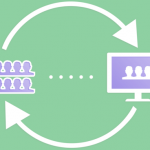How To Teach Your Brain Something It Won’t Forget A Week Later
Of all the things you learned in school, chances are the right way to learn wasn’t one of them.
To make it through academic life, most of us opt for what psychologists call “massed practice,” better known as cramming: It’s Monday and your test is Friday, so you save studying for the night before. One four-hour session can nab you a passing grade, so why not?
Well, because that’s not how your brain likes to absorb information. You might remember enough to pass your exam the next day, but just a week or two later and the details will already be fuzzy, if not gone completely. Here’s how to do better.
The Costs Of Cramming
It’s easy to carry those bad learning habits into working life, reviewing the key materials for a big meeting just an hour beforehand, or staying up the night before to prepare for a presentation.
But this approach is neither sustainable nor scalable. In my consulting work at the NeuroLeadership Institute (NLI), I meet countless employees at hundreds of companies who are drowning under the weight of all the new skills and processes they’re asked to pick up quickly and completely, remember, and then put into practice. It’s a surefire recipe for burnout and ever-falling productivity.
As brain scientists have dug into how learning really works, they’ve discovered that massed practice only leads to remembering things over the short term. You study Thursday, take the test Friday, and forget it all by Sunday. It’s a fine strategy for when you’re learning something you don’t really care about. But if you want (or need) the learning to stick–like, say, because it’s going to increase your performance or improve your career–it pays to space things out.
Letting Your Brain Do The Work For You
The “spacing effect” is one of the most consistently replicated mental processes in psychological history, dating back to Hermann Ebbinghaus, who observed it in 1885. With a little more planning and foresight, you can tap into that cognitive phenomenon to take better advantage of how your brain actually works.
According to Lila Davachi, a Columbia University cognitive neuroscientist specializing in memory and an NLI research scientist, spacing gives you extra learning “for free.” You don’t have to study any more, she says, and you could maybe even get away with less.
“We measure experiment participants’ brain activity while they’re learning, trying to take in the information, and then ask them to rest,” Davachi says of her research. “Unbeknownst to the subject, we’re looking at their brain during rest. And they’re just mind wandering.” This stage is crucial, she explains. “We see there is a footprint of what was happening during the learning; the brain continues to rehearse the prior information.” Davachi has found that participants whose brains show more replay during that rest period do better on recall tests later.
“Your brain is doing your work for you while you’re doing other tasks,” she adds.
How To Put Spacing Into Practice
A four-hour marathon study session (or team meeting or conference presentation) demands a ton of sustained attention, the quality of which will inevitably dwindle the longer those periods last. It simply makes more sense, cognitively speaking, for teams to opt for small doses of high-quality learning–sessions lasting under an hour, with lots of discussion and participation–to make insights stick without taking up much time.
You can follow this same principle on your own. Rather than cramming four hours the night before a test or a meeting, schedule a handful of 30- to 60-minute sessions in the preceding week or weeks to prep on your own or have a friend or colleague quiz you.
It isn’t rocket science, but it does take a little forethought and time management. Sometimes an app can help. My kids, ages 13 and 16, use an app called Quizlet. You log the date of your test and what you need to learn, and the software creates a study plan for you to follow, sending reminders to keep you on track.
Whatever method you use, the scientific and actionable truth is this: Cramming for a meeting probably won’t help you show off your expertise in any meaningful way. The deeper conversations that let you demonstrate your knowledge all tend to require recall and insight–in other words, they rely on the stuff you can remember deeply and for a long time. But the good news is that your brain is already built to acquire and store information that way, just as long you space out the learning process from the outset. Done right, that will ultimately take less time and effort than any last-minute cram session ever could.
Mary Slaughter is Executive Vice President—Global Practices and Consulting at the NeuroLeadership Institute. She partners with clients to apply the insights of the brain sciences to transform conventional human-capital practices and create sustainable behavior change.
Fast Company , Read Full Story
(30)














